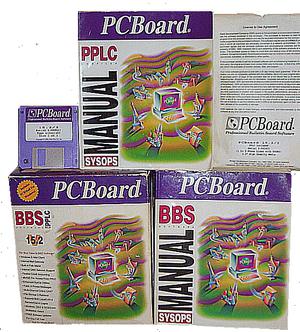Related Research Articles

A bulletin board system (BBS), also called a computer bulletin board service (CBBS), was a computer server running software that allowed users to connect to the system using a terminal program. Once logged in, the user can perform functions such as uploading and downloading software and data, reading news and bulletins, and exchanging messages with other users through public message boards and sometimes via direct chatting. In the early 1980s, message networks such as FidoNet were developed to provide services such as NetMail, which is similar to internet-based email.
FidoNet is a worldwide computer network that is used for communication between bulletin board systems (BBSes). It uses a store-and-forward system to exchange private (email) and public (forum) messages between the BBSes in the network, as well as other files and protocols in some cases.

An Internet forum, or message board, is an online discussion site where people can hold conversations in the form of posted messages. They differ from chat rooms in that messages are often longer than one line of text, and are at least temporarily archived. Also, depending on the access level of a user or the forum set-up, a posted message might need to be approved by a moderator before it becomes publicly visible.
Newsgroup spam is a type of spam where the targets are Usenet newsgroups.

MindVox was an early Internet service provider in New York City. The service was referred to as "the Hells Angels of Cyberspace".
Eternal September or the September that never ended is Usenet slang for a period beginning around 1993 when Internet service providers began offering Usenet access to many new users. The flood of new users overwhelmed the existing culture for online forums and the ability to enforce existing norms. AOL followed with their Usenet gateway service in March 1994, leading to a constant stream of new users. Hence, from the early Usenet point of view, the influx of new users in September 1993 never ended.

A shell account is a user account on a remote server, typically running under Unix or Linux operating systems. The account gives access to a text-based command-line interface in a shell, via a terminal emulator. The user typically communicates with the server via the SSH protocol. In the early days of the Internet, one would connect using a modem.
ISCABBS, also known as ISCA, is a bulletin board system ("BBS"), formerly based at the University of Iowa. Dave's own version of Citadel, an early branch of the Citadel/UX BBS software, was developed to run ISCA. Like most Citadels, the focus is almost entirely on conversation among users.
The Bread Board System (TBBS) is a multiline MS-DOS based commercial bulletin board system software package written in 1983 by Philip L. Becker. He originally created the software as the result of a poker game with friends that were praising the BBS software created by Ward Christensen. Becker said he could do better and founded eSoft, Inc. in 1984 based on the strength of TBBS sales.
WWIV was a popular brand of bulletin board system software from the late 1980s through the mid-1990s. The modifiable source code allowed a sysop to customize the main BBS program for their particular needs and aesthetics. WWIV also allowed tens of thousands of BBSes to link together, forming a worldwide proprietary computer network, the WWIVnet, similar to FidoNet.

PCBoard (PCB) was a bulletin board system (BBS) application first introduced for DOS in 1983 by Clark Development Company. Clark Development was founded by Fred Clark. PCBoard was one of the first commercial BBS packages for DOS systems, and was considered one of the "high end" packages during the rapid expansion of BBS systems in the early 1990s. Like many BBS companies, the rise of the Internet starting around 1994 led to serious downturns in fortunes, and Clark Development went bankrupt in 1997. Most PCB sales were of two-line licenses; additional line licenses were also available.

Novation, Inc., is an early modem manufacturer whose CAT series were popular in the early home computer market in the late 1970s and early 1980s, notably on the Apple II. The Hayes Smartmodem 300, introduced in 1981, helped kill off Novation and many other early modem companies over the next few years.

Phantom Access was the name given to a series of hacking programs written by Patrick Kroupa of LOD. The programs were worked on during the early to mid-1980s (1982–1986), and designed to run on the Apple II computer and Apple-Cat modem.
Panix is the third-oldest ISP in the world after The World and NetCom. Originally running on A/UX on an Apple Macintosh IIfx, Panix has gone through a number of transitions as the Internet has grown. It maintains a vibrant community of shell users and posters to its private panix.* USENET newsgroups.
A Usenet personality was a particular kind of Internet celebrity, being an individual who gained a certain level of notoriety from posting on Usenet, a global network of computer users with a vast array of topics for discussion. The platform is usually anonymous, although users can get celebrity status, usually by being deemed different from other posters in some way.
Forum 80 refers to a BBS software created in 1980 by Bill Abney of Kansas City (MO) in the US for running a BBS on a Tandy TRS 80 computer. The software, and the name is most notable for being the first BBS in the UK.
GT Power is a bulletin board system (BBS) and dial-up telecommunications/terminal application for MS-DOS. It was first introduced in the 1980s by P & M Software, founded by Paul Meiners. GT Power can be used both to host a BBS as well as to connect to other BBS systems via its full-featured dial-up "terminal mode". GT Power was a shareware package that required a registration fee in order to access its proprietary network mail transport/handling software and, by default, the GT Power Network. The software is distributed in two "flavors": a terminal-only version, nicknamed GTO, and the full-featured host and terminal version.

Usenet, USENET, or "in full", User's Network, is a worldwide distributed discussion system available on computers. It was developed from the general-purpose Unix-to-Unix Copy (UUCP) dial-up network architecture. Tom Truscott and Jim Ellis conceived the idea in 1979, and it was established in 1980. Users read and post messages to one or more topic categories, known as newsgroups. Usenet resembles a bulletin board system (BBS) in many respects and is the precursor to the Internet forums that have become widely used. Discussions are threaded, as with web forums and BBSes, though posts are stored on the server sequentially.

Religious Technology Center v. Netcom On-Line Communication Services, Inc., 907 F. Supp. 1361, is a U.S. district court case about whether the operator of a computer bulletin board service ("BBS") and Internet access provider that allows that BBS to reach the Internet should be liable for copyright infringement committed by a subscriber of the BBS. The plaintiff Religious Technology Center ("RTC") argued that defendant Netcom was directly, contributorily, and vicariously liable for copyright infringement. Netcom moved for summary judgment, disputing RTC's claims and raising a First Amendment argument and a fair use defense. The district court of the Northern District of California concluded that RTC's claims of direct and vicarious infringement failed, but genuine issues of fact precluded summary judgment on contributory liability and fair use.
Plover-NET, often misspelled Plovernet, was a popular bulletin board system in the early 1980s. Hosted in New York state and originally owned and operated by a teenage hacker who called himself Quasi-Moto, whom was a member of the short lived yet famed Fargo 4A phreak group. The popular bulletin board system attracted a large group of hackers, telephone phreaks, engineers, computer programmers, and other technophiles, at one point reaching over 600 users until LDX, a long distance phone company, began blocking all calls to its number (516-935-2481).
References
- ↑ "List of 212 BBS'". Archived from the original on 2008-03-04.
- ↑ "BBS: The Documentary". www.bbsdocumentary.com. Retrieved 2023-03-31.
- ↑ ".:: Phrack Magazine ::". Archived from the original on 2007-10-15. Retrieved 2008-03-20. Phrack Volume Three, Issue 30, File #2 of 12, Network Miscellany III
- ↑ Message from Rob Sweeney comparing BEC to operating a coffeehouse "Future Culture (an online zine) Issue #364". April 16, 1993. Archived from the original on 2005-02-22.
- ↑ http://groups.google.com/group/rec.music.gaffa/browse_thread/thread/de86b43ec04d4f22 Usenet articles posted by Big Electric Cat users continued to appear until early June 1990.
- ↑ "HyperCard performance analysis with large datasets: Some answers". 1988. Archived from the original on 2007-05-29. Usenet posting originating from the Big Electric Cat written by Panix founder Alexis Rosen
- ↑ http://catless.ncl.ac.uk/Risks/5.77.html The Risks Digest, Volume 5: Issue 77 Thursday, 17 December 1987, with a posting from Eric Corley